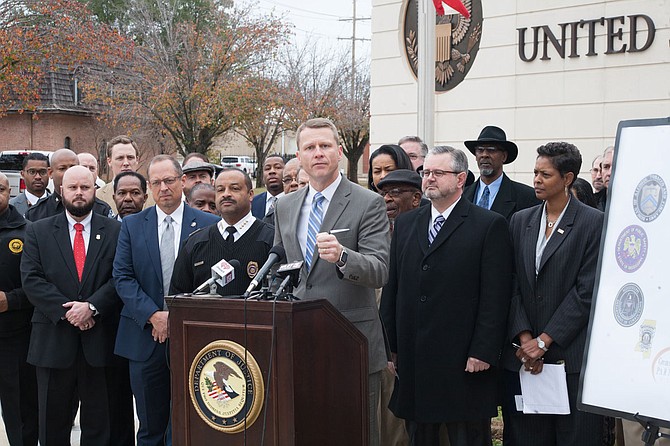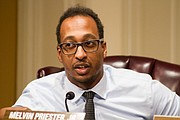U.S. District Attorney Mike Hurst announced Project EJECT on Dec. 7, 2017 with then-Jackson Police Chief Lee Vance (left) and former FBI Special Agent Christopher Freeze (right). Photo by Stephen Wilson
Lionel Walker was driving with his family in Jackson on New Year's Eve morning when an SUV pulled up next to his vehicle on Medgar Evers Boulevard, and at least one man began firing gunshots at Walker's car. In addition to Walker, his partner Lucenda Snell sat in the passenger seat with Snell's two children and her mother in the backseat.
A trail of bullets followed Walker's vehicle for nearly a mile to a Church's Chicken restaurant further west, until the family ended up back at the intersection of Medgar Evers and Rutledge Avenue, where the shooting had started.
Walker and Snell were not injured. But the suspect shot Snell's 13-year-old daughter and 1-year-old son, who were sitting in the back of the car alongside their grandmother Tammy Snell.
The baby boy suffered a gunshot wound to the head, and the young girl was shot in the arm, fracturing her bone. The infant was in critical condition at the University of Mississippi Medical Center as of Dec. 31. At a press conference later that day, JPD Public Information Officer Sam Brown told reporters that the shooting appeared to target the people in the vehicle. Police had not determined a motive for the shootings at press time.
Less than a week earlier, JPD Chief James E. Davis had held another press conference to highlight the results of his department's renewed efforts to curb gun violence in Jackson on the heels of what he called "a very violent week" in the city.
Speaking from JPD headquarters on Dec. 26, Davis announced 82 arrests through a new task force called "Operation Targeting Gun Violence." He described the task force as a collaborative effort between 40 JPD detectives; the Bureau of Alcohol, Tobacco, Firearms and Explosives; the Federal Bureau of Investigation; the Drug Enforcement Administration; and the U.S. Marshals Service.
Davis revealed the task force three days after U.S. Attorney for the Southern District of Mississippi Mike Hurst blasted Jackson local elected officials for being too soft on crime. Hurst singled out local judges in Jackson, accusing them of releasing violent offenders from jail and compromising the public safety of the city's residents. He also suggested that local politicians downplayed violent crimes in Jackson.
"To the politicians: Quit denying there's a gun problem in Jackson. Quit denying there's a crime problem, a drug problem, a gang problem, in our capital city," Hurst said at his press conference.
Hurst pointed to 25 arrests in Jackson between Dec. 17 and Dec. 20 through Project Guardian—another joint initiative between federal, state and local agencies to combat crime—as proof of elevated crime levels in Jackson. Hurst did not respond to a Jackson Free Press interview request.
'A Criminologist's Nightmare'?
In 2018, Jackson saw 84 murders, its highest homicide rate in 20 years and a 31% increase from the previous year. The spike in deadly violence happened to coincide exactly with Hurst's and JPD's December 2017 announcement of another joint task force promising to reduce violence: Project EJECT (Empower Jackson Expel Crime Together), the local version of an old federal policy plan then-U.S. Attorney General Jeff Sessions brought back.
Project EJECT Expels Gun Offenders to Faraway Prisons
U.S. Attorney General Jeff Sessions' Project EJECT is a controversial blast from the past.
Under Project EJECT, which then-JPD Chief Lee Vance supported, the U.S. attorney's office could prosecute those arrested for gun-related crimes, resulting in people being sent away to distant prisons across state lines. Vance, who soon left JPD, is the new sheriff of Hinds County.
David Kennedy, a criminologist at John Jay College of Criminal Justice in New York, once described Project EJECT to this newspaper as an "evidence-free strategy" and "a criminologist's nightmare," even though Hurst had claimed to the Jackson Free Press that Project EJECT was based on the Kennedy-led Operation Ceasefire. Also known as the Boston Gun Project, Operation Ceasefire was a policing strategy in Boston in 1996 that backers say resulted in a significant reduction in gun violence and youth homicides there.
Law-enforcement efforts to combat violent crime in Jackson in recent years have increasingly focused on the creation of multi-agency task forces. A task force's purpose is to identify high-crime regions or criminal activity, gather intelligence, and serve subpoenas, warrants and indictments related to those crimes. They are not necessarily designed to prevent or handle crimes in real time. A person arrested for a crime may have committed the offense days, months or even years ago.
Hurst's Dec. 23 press conference highlighted Project Guardian, another U.S. Department of Justice initiative launched in November 2019. The nationwide initiative aims to reduce gun violence across the country through collaborative efforts between federal, state and local agencies. The DOJ describes it as "a complementary effort to the success of Project Safe Neighborhoods (PSN)," the umbrella initiative under which Hurst's office implemented Project EJECT.
Brown said "Operation Targeting Gun Violence" is not related to Project EJECT, although he confirmed that the City of Jackson and JPD are still participating in Project EJECT. The mayor was not available to comment by press time.
But despite the task-force proliferation, violent crime rates in Jackson have surged since 2017. The JPD confirmed that Jackson had seen 82 homicides in 2019, down just 2% from a dramatic spike in homicide last year.
Hinds County Senior Circuit Judge Tomie Green said Hurst's accusation that local judges are contributing to increases in violent crime by releasing dangerous individuals was surprising, inaccurate and inappropriate.
"I've never discussed nor has he attempted to discuss with me, and as far as I know, any other circuit judge in Hinds County, about our process, and any problems we might have," Green said, adding that, as a U.S. attorney, Hurst is not privy to what goes on in the local court system.
"It's hard for me to understand how you criticize a system that you're not operating in in terms of criminal cases," she said.
Task Forces: 'A Waste of Time'?
Likewise, Ward 2 Councilman Melvin Priester Jr., who often addresses violence publicly, responds that Jackson leaders do not deny or try to understate the problem of gun violence in the capital city.
"I genuinely believe attorney Hurst is approaching this problem from a place of genuine concern and a desire to make Jackson better," Priester said in an interview. "... (But) we have some differences in opinion about how to achieve the ultimate goal of decreasing gun violence."
Priester said decreasing gun violence and other violent crimes requires deep structural and cultural changes within the local justice system, changes that require "pure cooperation" between the DA's office, local judges, law enforcement and even schools. He pointed to recommendations from a 2016 Mississippi Legislature-funded BOTEC study on crime and the justice system in Jackson as viable solutions.
"The concern a lot of people have about things like Project EJECT is you aren't necessarily getting the deterrents you want because there is so little hope among some of the people that are doing some of these crimes that it doesn't change their calculus in terms or committing a crime or not committing crime," Priester said.
"That's why it's so important for us to really ... focus on things like intervening with younger people before they become truly ensnared in the criminal-justice process," Priester continued. He added that "(creating) a more efficient pathway between arrest and trial" is also critical, given the county's problem with prolonged pretrial detention.
Ron Noblet, a Los-Angeles-based gang and violence expert who was a lead investigator in the BOTEC study on crime and gangs in Jackson, says task forces and over-policing are generally ineffective in preventing violence.
"The primary reason for a task force is to make local officials and the general public feel good," Noblet said in an interview in early January 2020. "Task force(s) almost inevitably are a waste of time and money, and usually the people indicted, if there's indictments, are already locked up, or on the run and very seldom somebody they arrest."
Never Back Down: Mississippi Escalates War on Gangs
A proposed gang bill was not based on current evidence-based violence research. It died in the Legislature.
As part of Project EJECT, Hurst has heralded multi-agency sweeps that not only bring in gun-related arrests, which are the stated point of the Project Safe Neighborhood/Project EJECT strategy, but also arrests for gang membership, fraud and drug sales.
In Los Angeles, Noblet heads the gang-intervention team at the Urban Peace Institute, where he conducts outreach to families, works to de-escalates violence, and strategizes ways to improve police and community relations. Tackling the root of violence, he maintains, requires tackling disinvestment in communities.
"I would bet that many of those killings are in the 'bottoms' (of Jackson)," Noblet said in an interview, reflecting on areas he studied in Jackson with high homicide rates and gang violence, as well as blight. The real cause of violence, Noblet maintains, is poverty, poor education, and drug addiction and trafficking, among other markers of socioeconomic disenfranchisement.
Police should work on building long-term relationships with community members rather than acting as an "occupying force" during big sweeps, he added.
At an Oct. 18 Jackson Police Department COMSTAT meeting, Ryan James, a supervisory special agent with the FBI's Jackson division, pointed to yet another task force: the FBI's Violent Crime Task Force.
"For us, our Violent Crime Task Force ... we're kind of trying to shift focus a little bit from the Project EJECT stuff, which you guys have heard of for the last three years," the FBI's James said. "We are trying to take a more proactive approach, to the extent that you guys, you know, on patrol or whatever, get informants that are willing to or can or know where guns are located, we'll spend some money and go buy those and, you know, hit those houses. ... We can throw some resources behind that just to try to get these (guns) off the street before they're using them (in) frivolous fights that turn into homicides."
Preventing Gun Violence
JPD Chief Davis broke down the nature of the arrests through "Operation Targeting Violence" during his Dec. 26 public appearance.
Police made 53 felony arrests and charged 33 people with misdemeanors. Twenty-two people face murder, aggravated assault or armed robbery charges, and six were arrested for felony possession of a firearm. JPD seized 18 guns "from the hands of very dangerous individuals," Davis said.
The JPD also made three murder arrests during that period—19-year-olds Kenterious Jones and Desmond Boothe and 21-year-old Tatyana Mack for the shooting death of Jorge Velazquez Morales, 29, on Interstate 20 on Dec. 6.
The JFP's 'Preventing Violence' Series
A full archive of the JFP's "Preventing Violence" series, supported by grants from the Solutions Journalism Network. Photo of Zeakyy Harrington by Imani Khayyam.
The easy availability of guns in Mississippi, which Vance has said is due in part to lax gun laws in the state, becomes especially lethal when they end up in the hands of those who lack conflict-resolution skills. People who resort to violence often do so because they simply have not been taught how to work through conflict other than through violence, Noblet said.
"Conflict by itself is necessary, it is a necessary thing to grow, but conflict too often by people who have not had any training ... can escalate from just you and I disagreeing to one of us picking up a gun and shooting because we don't know any better," Noblet said in the interview.
Meaningful intervention, Noblet added, requires counseling those who are vulnerable to committing crimes before they resort to violence, especially in the aftermath of violence that has just occurred, which can lead to further retaliatory actions. "It takes time, and it takes patience, and it takes a willingness to sit and listen to the screaming and the yelling and the anger," he said of effective intervention.
Noblet's suggestion is in line with a credible-messenger and violence-interruption strategy the City of Jackson is trying to launch this year, wherein people conduct on-the-ground outreach to dissuade at-risk youth and adults from partaking in criminal activity and often viral violence.
The model requires that messengers, who themselves have been victims or perpetrators of crimes—frequently both—come from the same backgrounds as those they are trying to counsel. This shared background distinguishes credible messengers from traditional counselors and allows them to reach those who are most vulnerable and who may not otherwise respond to advice.
Studies show that credible messaging and violence interruption work when implemented full-time and with adequate funding. Though the City of Jackson has earmarked a small amount of money toward launching the program and has some outside startup money, funding remains the biggest obstacle to implementing an impactful and sustainable initiative here.
Police Growing Gangs?
Public announcements about task forces and police sweeps may be a public-relations tool in times of spikes in violence, but they may actually have the effect of increasing violence and crime over time, experts like Noblet say. Increased police aggressiveness through sweeps, task forces and overall increased police presence can make an area ripe for further gang recruitment, the gang expert warned.
Hopelessness in a community, reflected through sustained police presence and profiling, is a major reason that young people join gangs in the first place—for a feeling of belonging and brotherhood. "There would be no gangs if families were cohesive, if there was hope in the community or within a family. There is no reason for a gang if there is hope," Noblet said.
Because of the nature of policing—especially gang enforcement—innocent families or people who happen to be in close proximity to where a crime has occurred inevitably end up affected or caught up in the criminal-justice system, despite their innocence, Noblet said. This can further erode trust between law enforcement and a community plagued by high levels of crime, he added.
Judge Tomie Green says law-enforcement agencies and public officials need to consider gun violence within the larger context of legislation and work together to arrive at solutions—not just point fingers at one another.
Green said local judges do not simply release people from jail, responding to both Hurst and popular political accusations that ignore the unconstitutionality of prolonged pretrial detention before indictment, which is rampant in the county and state.
In 2016, the Hinds County Detention Center was placed under a federal consent decree precisely for that reason, following a U.S. Department of Justice investigation into the jail.
In 2017, the Mississippi Supreme Court ruled that circuit judges must review a person's conditions for release at the start of each circuit term if that person had been in jail pre-indictment for over 90 days.
Four years after the DOJ's investigation, the Hinds County Detention Center is still not meeting federal compliance standards, owing to staffing issues, which fall under the purview of the sheriff's office, and facility insecurities, which the Hinds County Board of Supervisors oversees.
"Nobody is just being let out over and over again," Green said. "But people have to have evidence at trial or (if) the person pleads guilty, to justify holding them in jail. Police officers charge murders, but there may be some circumstances that cause ... prosecutors to re-look at cases. And either there is not enough evidence, or there is a defense to the evidence, but each case stands on its own."
Judge Green emphasized that efforts to solve the gun-violence epidemic must include a reckoning with the culture and legislation around guns at both the national and local levels.
"We're in a nation that is in love with guns, and the South is certainly not an exception," Green said. "Nobody seems to want to give up guns, but they want to quickly blame someone with guns."
"We've got to find a way that our laws are not so liberal. ... It's not going to stop until we recognize that we've got a problem with guns throughout the nation."
Follow City Reporter Seyma Bayram on Twitter @SeymaBayram0. Send tips to [email protected]. Read solutions approaches at jfp.ms/preventingviolence.
More stories by this author
- City Announces Robinson Road Repaving Project; Stay-At-Home Order Still in Effect
- City of Jackson Sues Canadian National Railway Over Blocked Railroad Underpass
- Mayor Lumumba Revises, Extends Jackson Stay-at-Home Order
- Mississippi Justice Institute Sues Mayor Lumumba for Open-Carry Order
- Jackson Attorney with COVID: ‘A False Sense of Protection Here’








Comments
Use the comment form below to begin a discussion about this content.
comments powered by Disqus